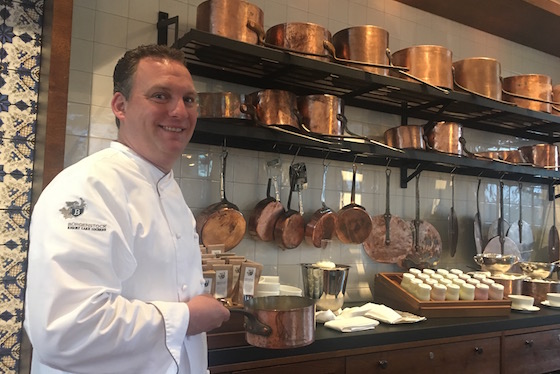“I jumped at the opportunity to set up the largest food operation in the European hospitality scene”, says Mike Wehrle, culinary director of Bürgenstock Hotels & Resort, Lake Lucerne, Switzerland.
The multi-building mountaintop resort, whose first hotel opened in 1873, had died a slow death before closing entirely at the end of 2011. It was bought by Katara Hospitality, and after an expansion spend so large that no one dared mention the amount, it re-opened its doors on August 28, 2017.

By the time it is fully operational once again, mid-December, there will four hotels (383 rooms total), 12 restaurants and numerous other eating and drinking venues, plus substantial MICE business.
“Already we are doing over a thousand covers a day, plus feeding 300 of the team members who live onsite – and they live well, as although left-overs obviously have to be binned, sometimes there is extra supply, for them”, Wehrle explained.
He has 110 cooks, including five hotel school students doing stages (next year he will start his own three-year apprentice scheme). “It really was not too much of a challenge to get my brigade as I have traveled extensively, including working for Peninsula around Asia for the last eight years. My contacts are pretty good, and I was able to attract the specialists needed for our niche restaurants, which include Iranian and pan-Asia. About 40% of my cooks are female.”
Wehrle joined the complex in January 2017 and he and a nucleus of five were cooking occasionally from April onward, when Bürgenstock started taking events, sometimes up to 500 participants. “I still cook from time to time, but a lot of my attention now goes to sourcing products”.
He is a great believer in local is best, and for such basic essentials as bread, butter, chocolates and coffee he has worked with small suppliers within a few miles of the hotel. They provide what he has exactly specified, sometimes several times a day. One farmer is now producing varieties of berries that are never available commercially (some strawberries, for instance, have a shelf life of barely one day). There will eventually be a herb garden on the total-148-acre estate.
It is vital, he says, to have both a CEO, Bruno Schöpfer, and a complex GM, Robert Herr, who understand the importance of F&B – “I can get on with my job knowing I have top support that understands the importance of quality products, nice presentations and strong identity of every concept”, he explained.
“Yes, food costs are higher, sometimes up to 30%, if I go local, and I have to add into the balance sheet that I want to give customers choices, so we have Irish beef, for instance”, he admitted. “Overall though, I repeat that local is best. I never have to ask if something is bio as the farmers I visit are eating their own vegetables straight from the ground and they would not do that if there was even a hint of pesticides”.
Back home in Germany’s Black Forest, Wehrle always wanted to be a chef. To get it out of his system, his mother sent him to work with a cousin who had a restaurant. “My first months were pot-washing and floor-scrubbing and then eventually I graduated – to making salads. That is a far cry from my life today, using some of the same pots that Escoffier did (though our 120-year-old range is now just decorative), and, by the way, I am certainly not courting stars but if Michelin comes, it comes, and we will be very happy. My overall vision, however, is that this will be the best resort in Switzerland, offering a new and hot global eating destination.
